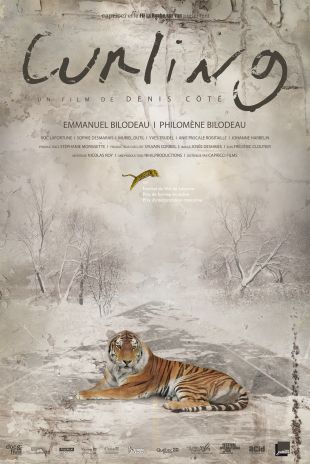
In the interest of full disclosure: Denis Côté's Curling is, I believe, a film that may play most effectively for viewers who possess as little foreknowledge as possible; even partial divulgation of the narrative to those who haven't seen it or already read a summary will likely damage its dramatic impact. As there is no way for me to coherently discuss this movie without ruining it, those who wish to read on will do so at their own risk.
The film unfolds in a grungy Quebec backwater, where an uneducated working-class-stiff named Jean-François (Emmanuel Bilodeau) holds down two jobs - one as a bowling alley repairman and another as a motel housekeeper - while attempting to raise his 12-year-old daughter, Julyvonne (Philomene Bilodeau), on the side. While the mother bides a multi-year prison sentence for some unspecified infraction, the father withholds the child from elementary school, and has her tend to the house while he's out working. He claims to provide home-based schooling for her, though his attempts at educating the girl seem feeble at best; even more troubling is her complete isolation from peers, which cripples her on multiple levels. When a local tragedy surfaces - a pack of hikers' corpses, frozen in the woods - the child responds in a bizarre and horrifying manner that unveils the full extent of her emotional and psychological damage.

What exactly is going on here, between father and daughter? One of the most fascinating angles of the film is that it seems to be constantly giving us all of the answers without telling us nearly as much as we want to know - for instance, in an opening sequence, some bystanders express on-the-nose concerns regarding Julyvonne's well-being, but oddly enough, this somehow fails to convey the full breadth and depth of the psycho-emotional damage that has delivered a devastating blow to the child's world. Over the course of this movie, the truth slips up on us like a silent predator, and for many viewers, full awareness may not completely register until thirty or forty minutes into the story. In other words, for a time, the artist stirs up a subtle, ongoing interplay in our minds - a dialectic between the dysfunctional behavior that happens so quietly and unceremoniously onscreen, and one's own need, as a viewer, to want to believe in at least the partial efficacy and sanity of Jean-François as a parent,, and Julyvonne's inner fortitude - despite many signs to the contrary. The drama becomes something of a lab experiment - Côté testing each viewer's level of perception and the rapidity with which one can size up the extent of the parental abuse, as the writer-director ticks off the signs of rationality one-by-one.
There is a stunning level of audacity in this picture, that lies in Côté's degree of investment of the viewer's sentience. The writer-director not only trims away weighty psychoanalytic exposition, but almost fully liberates the movie from it. A filmmaker sans a strong belief in audience perspicaciousness would feel the need to hammer out explanations for the Jean-François and Julyvonne pathologies, in the manner of a network telefilm; that would both insult the viewer, and burst the magnificent enigmas that linger at the movie's core and sustain its haunting fascination. The film's other key asset, which we've come to expect from Côté's prior and successive films, is the writer-director's willingness to not simply give us subjects with an unremittingly bleak road ahead, but linger on the scene with an unblinking eye as hope dims. A more conventional movie would drive home emotional satisfaction, via reprisals against the father, the materialization of resources for the little girl, or both; Côté gives us neither. At times, the writer-director hints at the possibility of some impending aid to Julyvonne - as when police cars careen past the house - but the director refuses to give the characters, or us, an easy out. Okay, he seems to be saying: families as tortured and lost as this exist all across North America, and never find deliverance, so why should this one? It takes shattering courage to make a movie so devastatingly sad and pessimistic and yet so credible, and such a film could easily risk infuriating an audience. To his complete credit, Côté doesn't seem to care.
Côté has indicated that he feels more satisfied with Curling than he did with his prior effort, 2008's Elle veut le chaos, and looking at the two films, one can grasp why: as bold and remarkable as that previous work was, it often seemed to be pushing the limits of the medium so aggressively that its formic manipulations stood out, at times threatening to become obtuse or self-conscious or existing for their own sake. If Curling isn't nearly as brazen or as daring in what it attempts, it's also a much smoother piece of work, more fluid in its construction, far more subtle and intuitive in its calculations, more mature and confident in its execution.
